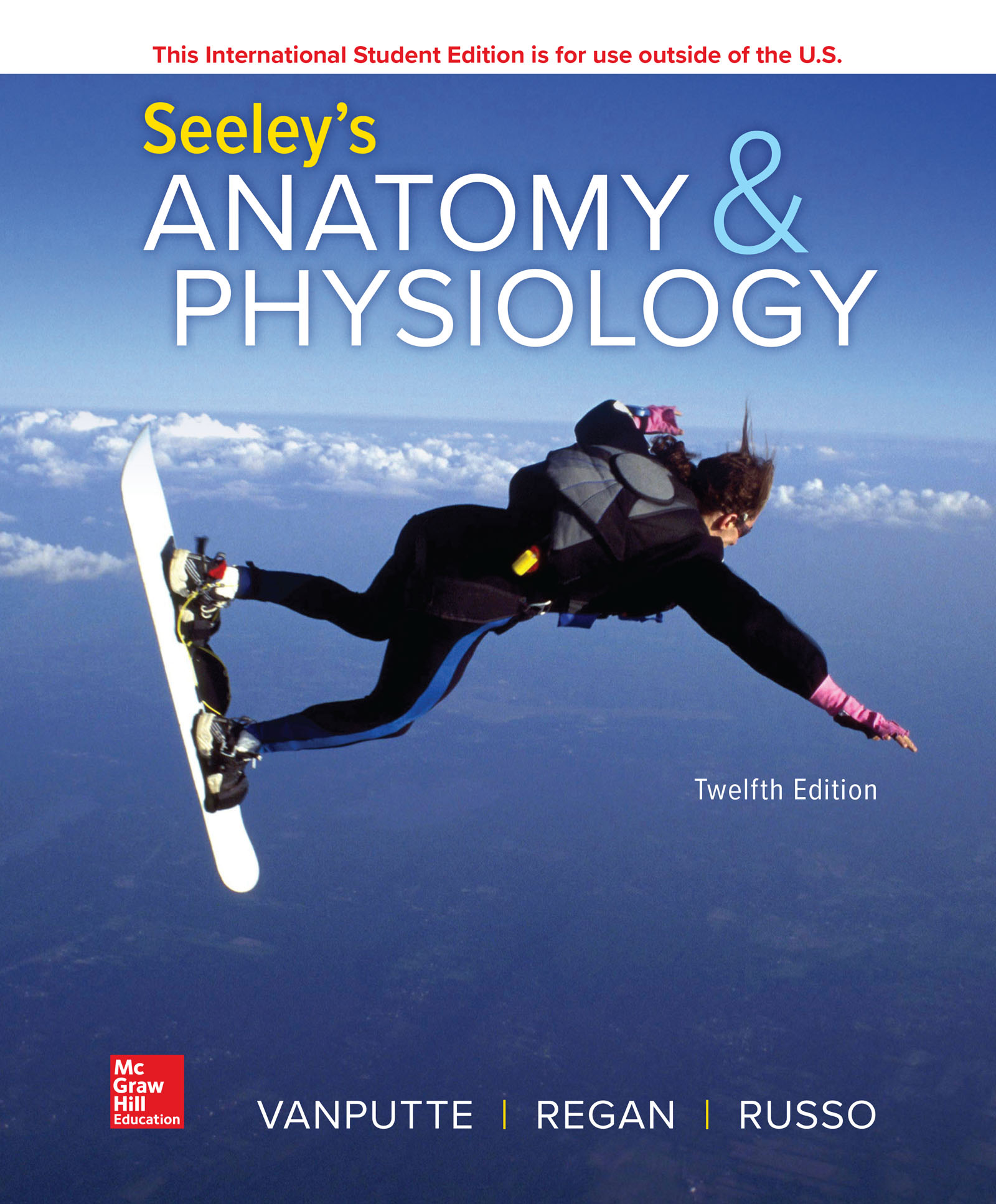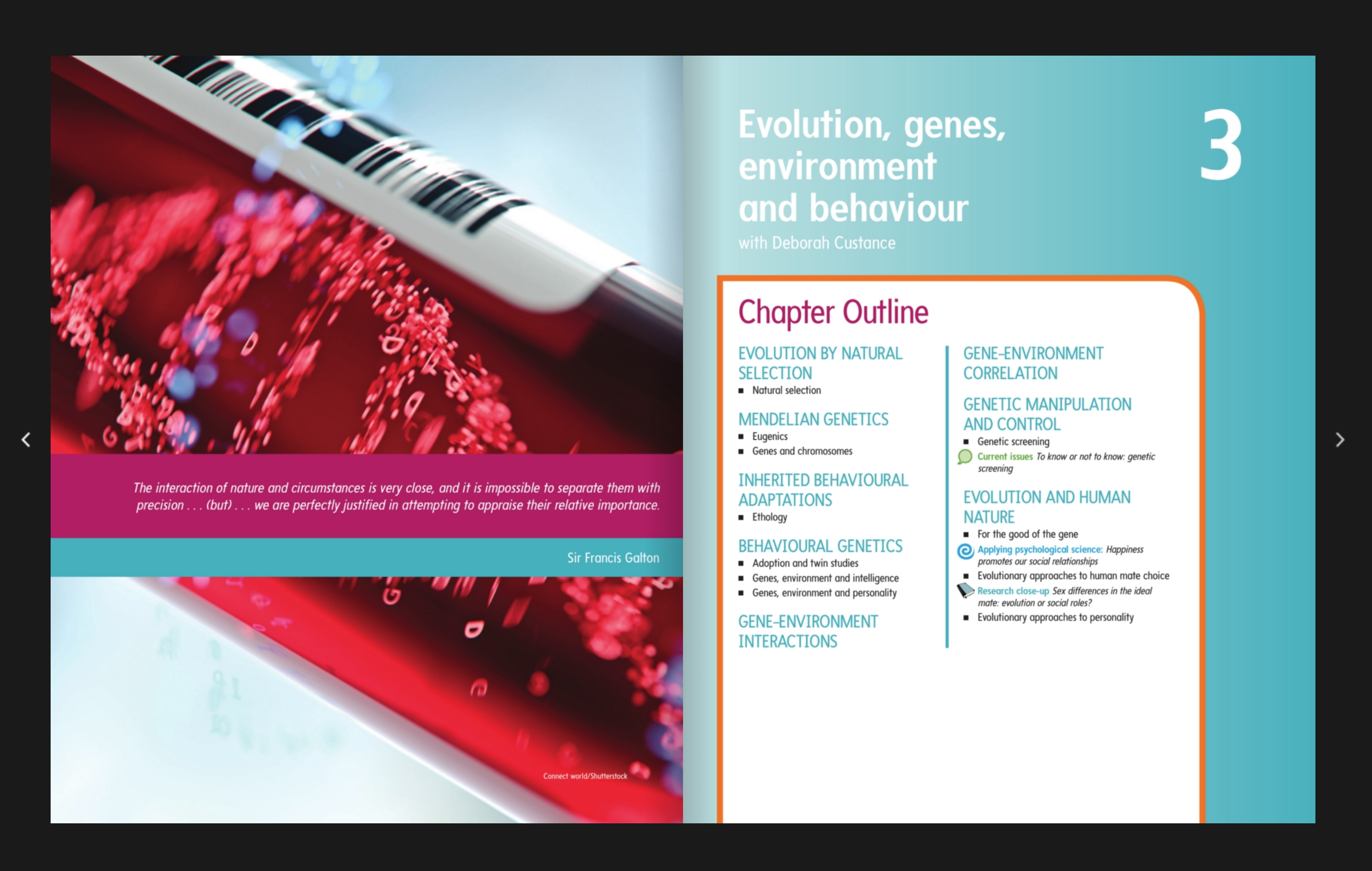Seeley's Anatomy and Physiology 12th edition
Cinnamon VanPutte, Jennifer Regan, Andrew Russo, Rod Seeley
ISBN: 9781260565966
Seeley's Anatomy & Physiology delivers clear descriptions, helpful pedagogy and an exceptional art program to help students develop a firm understanding of the concepts of anatomy and physiology and how to use that information to solve problems.
The twelth edition contiunes to provide comprehensive coverage of the essential concepts, with precise explanations of how structures function and work together to maintain life. It explores how the systems respond to aging, changes in physical activity, and disease, with a special focus on homeostasis and the regulatory mechanisms that maintain it. A problem-solving critical thinking framework is a hallmark of the text, designed to reinfornce key learning points and develop higher-order thinking skills.

What's new
Emphasis on Critical Thinking
Critical thinking focused pedagogy has been thoroughly integrated throughout the book. For example, Learn to Predict questions at the start of each chapter build students' application skills, while Predict questions give students the chance to practice these skills. Critical Thinking boxes provide exercises that challenge students to apply the concepts learnt to solve a problem.
Exceptional Art Programme
The dynamic art program offers full-colour illustrations and photographs to support the text, with consistent use of colour and arrow guides. Cadaver photos are of atlas-grade and are presented side-by-side with illustrations to help build comprehension. Online support is also available including a virtual cadaver tool.
Clinical Case Studies
A host of new and revised clinical features have been added to provide a complete picture for students including Clinical Impact and Clinical Genetics boxes. The Systems Pathology two-page spreads delve deeper into specific conditions relating to body systems, presenting the facts as simplified case studies.
About the authors
Nigel J. Holt, DPhil
Nigel is Head of the Department of Psychology at Aberystwyth University in Wales. His first degree from the University of Reading was followed by a DPhil from the University of York, where he investigated the perceptual lateralization of audio-visual stimuli. His current post followed a postdoctorate in speech perception, and a lectureship in England.
Nigel has examined at a senior level and is an external university examiner at various universities throughout the world. In between writing and editing more than 30 other books, he also researches into speech perception, and how sound and other areas of cognition interact with potentially dangerous activities such as cycling and motorcycling.
Andy Bremner, DPhil
Andy completed his first degree in experimental psychology and his DPhil at the University of Oxford under the supervision of Professor Peter Bryant. Following two postdoctoral appointments, he spent 13 years in the Department of Psychology at Goldsmiths, University of London, latterly as Head of Department.
In 2018, Andy moved to the University of Birmingham, where he is a Reader in Psychology. Andy conducts research in the Birmingham BabyLab into a variety of questions surrounding perceptual and cognitive development and developmental cognitive neuroscience. He has been awarded substantial grant funding and prizes for his research and is co-editor of Infant and Child Development with Robin Banerjee.
Michael Passer, PhD
Michael coordinates the introductory psychology programme at the University of Washington.
Ronald E. Smith, PhD
Ronald is Professor of Psychology and Director of Clinical Psychology Training at the University of Washington, where he also has served as Area Head of the Social Psychology and Personality area.
Ed Sutherland, PhD
Ed completed his first degree at the University of Bangor and his PhD at the University of Wolverhampton under the supervision of Professor Ken Manktelow. He then held a research post at the University of Reading and his first lectureship at the University of Derby. He became a lecturer in cognitive psychology at the University of Leeds, where he is now Director of Learning and Teaching. His current research interests are on the role of emotion in reasoning and the psychology of design.
Michael L. W. Vliek, PhD
Michael finished his Master’s followed by his PhD at the University of Amsterdam, where he subsequently worked as a senior lecturer until 2017. He is currently an affiliate of the University of Amsterdam and lectures at the University of Tübingen. He is also the co-author of several psychology textbooks and consultant on behaviour change for several government institutions in the Netherlands.
Transform learning: boost grades, stimulate engagement and deliver an amazing course
Improve student motivation and confidence with Connect Psychology with SmartBook integration.
A learning and teaching environment that provides everything you need for seamless lesson planning, assignment setting and insightful tracking of student progress, while allowing students to master what they need, when they are ready, by using adaptive technology to create personalised learning journeys.
Connect also provides access to a wealth of tools and resources to help you deliver engaging lessons and support student comprehension.
Students can struggle to apply scientific data and form hypotheses. Psych Interactives help bring these processes to life for students by placing them in a real-world scenario a psychologist may encounter.
The interactives take students step-by-step through observing data, formulating and testing a hypothesis, through to communicating their findings and applying their understanding of psychology to the world.
Moving students toward higher-order critical thinking skills, Power of Process offers a hands-on tool for reviewing and analysing journal articles. Students gain access to a library of resource materials, which they are guiding through using a scaffolded framework to develop essential academic skills, such as understanding, analysing and synthesizing.
With you all the way
To access your digital version of your Review Copy please complete the form below and we'll make the title available for you on our partner website - Vital Source.
Alternatively, our dedicated Academic Consultants, Digital Success and Customer Support teams are there to help you discover the right solution for your needs. We can create a bespoke offering that will allow you to achieve the institutional and commercial objectives of your learning & teaching programme.
Whether you want to adopt one of our titles or explore the use of our adaptive learning and teaching platforms, we will partner with you every step of the way to help ensure you unlock the potential of every student.
Simply complete this form to take your next step on your learning journey with McGraw-Hill Education.

